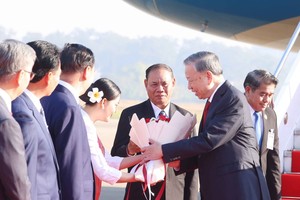According to the video footage that runs 2 1/2 minutes, the Hwasong-14 missile was moved on a transport erector launcher, known as a TEL, before being fired from a ground-based launch pad.
The method of launch was similar to one disclosed in separate TV footage released on July 5 following North Korea's first intercontinental range ballistic missile launch.
Earlier, Pyongyang's official KCNA claimed that the North successfully launched another intercontinental ballistic missile (ICBM) Friday night following its first test in early July, noting that the missile flew 998 kilometers for about 47 minutes into the East Sea after reaching a maximum altitude of 3,724.9 km.
In the footage unveiled by Korean Central Television, a TEL with eight wheels on each side drove slowly to the launch pad in Mupyong-ri in the country's northern province of Jagang, carrying the Hwasong-14 missile aboard.
The missile was then placed upon the ground-based launcher and erected to an upright position.
Like in the previous ICBM test-fire, North Korean leader Kim Jong-un was seen overseeing the launch preparations at the scene and chatting with his aides with a somewhat nervous face.
North Korea again used the ground-based launcher for the test-fire of the Hwasong-14. In its test-fire of an intermediate-range ballistic missile on May 14 and an ICBM missile on July 4, the North also adopted the same method.
Experts speculate that the use of a ground-based launcher may be intended to protect the high-priced TEL. In addition, the North may be able to carry out additional missile launches by use of the TEL, they noted.
North Korea is believed to possess about 200 TELs.
After the countdown was over, the Hwasong-14 missile flashed in all directions and lifted off vertically toward the night sky, according to the TV footage. Under the first-stage propulsion, large and small flame gusts were observed from a main engine and four auxiliary engines, it showed.
The footage showed a stable liftoff of the missile but didn't include the separation of the first and second stages.
North Korea is believed to possess about 200 TELs.
After the countdown was over, the Hwasong-14 missile flashed in all directions and lifted off vertically toward the night sky, according to the TV footage. Under the first-stage propulsion, large and small flame gusts were observed from a main engine and four auxiliary engines, it showed.
The footage showed a stable liftoff of the missile but didn't include the separation of the first and second stages.
























